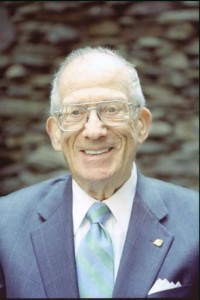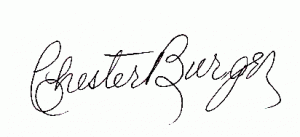This post is part of The Plank Center’s Legacies from Legends in PR Series that was begun in recognition of the 40th Anniversary of the Public Relations Student Society of America in 2007.
Former President, Chester Burger & Company. Soldier, World War II. CBS Television News, 1946-1954; first U.S. television news reporter, later national manager. Public Relations, 1955-1962: President of McCann-Erickson’s public relations firm. Awarded Medal for Outstanding Service to the United States, by the U.S. Government, 1995. Recipient of the PRSA Gold Anvil Award, the Arthur W. Page Hall of Fame Award and the Alexander Hamilton Medal.
Arthur W. Page, while serving AT&T as its first vice president for public relations, said: “A company’s reputation is chiefly dependent on what it does, and in a lesser degree on what it says, and the lesser degree becomes very small indeed if what it says and what it does do not jibe.”
Yes, communications is essential. But, communications constitutes the last part of professional public relations, not the first. Hard reality will always overcome communications programs, good publicity or even skillful propaganda.
Reality should be the rock on which any public relations campaign stands. Customers know. The word gets around when products don’t deliver promised results. Employees know when they are treated unfairly. Voters know when the candidates misrepresent, exaggerate or lie to them. Citizens recognize when public officials serve selfish, partisan interests instead of the general public.
But it isn’t as simple as that. Folks don’t discover things right away. Sometimes, they’ll endure two or three bad experiences in a restaurant before they decide not to return. Or they’ll endure years of abuse from a boss before they decide their company just isn’t a good place to work. Sometimes voters enthuse over a politician’s rhetoric for years before they recognize she or he is a fraud.
It’s part of the human experience that people (just like you and me) don’t like to admit they’ve been wrong, or they’ve made a mistake, or misjudged a product, a public figure or a policy. So they see (usually unconsciously) some excuse to rationalize their error and to change their judgment. That’s why public opinion changes slowly. That’s why even the most effective public relations campaigns show results very slowly. We communicate almost instantaneously these days, but public opinion changes very slowly.
The skilled professional tries to discover reality before worrying about what to communicate. She/he wants to know objectively what actions deserve public approval and which do not. And then she/he tries to persuade management to change and correct those policies that may irritate the public, the customers and the community. Only when the policy serves the public interest can good communications make a difference.
Experience has taught me that the most difficult problem in life (and not limited to professional public relations) is “telling truth to power.” It is not easy to tell the boss he or she is wrong. Integrity requires it. But how to “tell the truth to power” is an art not quickly learned. No one, and especially not clients and executives, like to be told they have erred. How to tell “truth to power” requires sensitivity, tact and perhaps humility, too. But learning how will provide the difference between success or failure in your career.
Those are among the most important lessons life has taught me.
Published: 2007
* Deceased (1921-2011)

